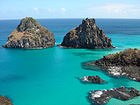- Marine regression
-
Marine regression is a geological process occurring when areas of submerged seafloor are exposed above the sea level. The opposite event, marine transgression, occurs when flooding from the sea covers previously exposed land.[1]
Evidence of marine regressions and transgressions occurs throughout the fossil record, and these fluctuations are thought to have caused (or contributed to) several mass extinctions, among them the Permian-Triassic extinction event (250 million years ago) and Cretaceous–Tertiary extinction event (65 Ma). At the time of the Permian or P/T extinction, the largest extinction event in the Earth's history, global sea level fell 250 meters, or more than 800 ft.[2]
During the ice ages of the Pleistocene, a clear correlation existed between marine regressions and episodes of glaciation; as the balance shifts between the global cryosphere and hydrosphere, more of the planet's water in ice sheets means less in the oceans. At the height of the last ice age, at around 18,000 years before the present, the global sea level was 120 to 130 meters (400 ft.) lower than today. A cold spell around 6 million years ago was linked to an advance in glaciation, a marine regression, and the start of the Messinian salinity crisis in the Mediterranean basin. Some major regressions of the past, however, seem unrelated to glaciation episodes — the regression that accompanied the mass extinction at the end of the Cretaceous Period being one example.
A major regression could, in and of itself, cause marine organisms in shallow seas to go extinct; yet mass extinctions tend to involve both terrestrial and aquatic species, and it is harder to see how a marine regression could cause widespread extinctions of land animals. Regressions are therefore seen as correlates or symptoms of major extinctions, rather than primary causes. The Permian regression might have been related to the formation of Pangaea: the accumulation of all the major landmasses into one body could have facilitated a regression, by providing "a slight enlargement of the ocean basins as the great continents coalesced."[3] Yet this cause could not have applied in all, or even many, other cases.
A clear and certain understanding of major marine regressions has not yet been achieved; according to one hypothesis, regressions may be linked to a "slowdown in sea-floor spreading, leading to a generalized drop in sea level (as the mid-ocean ridges would take up less space)...."[4] In this view, major marine regressions are one aspect of a normal variation in rates of plate tectonic activity, which lead to major episodes of global volcanism like the Siberian Traps and the Deccan Traps, which in turn cause large extinction events.
See also
References
- ^ Monroe, James Stewart, and Reed Wicander. Physical Geology: Exploring the Earth. Fifth edition; Thomson Brooks/Cole, 2005; p. 162.
- ^ Courtillot, Vincent. Evolutionary Catastrophes: The Science of Mass Extinction. Cambridge, Cambridge University Press, 1999; p. 89.
- ^ Ward, Peter D. Rivers in Time: The Search for Clues to Earth's Mass Extinctions. New York, Columbia University Press, 2000; p. 77.
- ^ Courtillot, p. 141.
External links
Categories:- Sedimentology
- Plate tectonics
- Extinction events
- Paleontology
Wikimedia Foundation. 2010.


